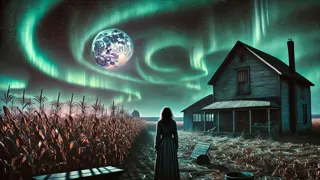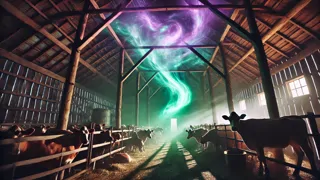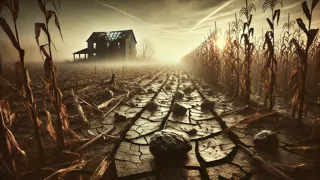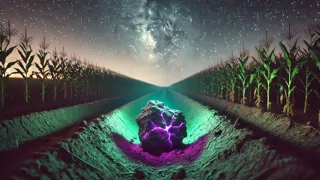Introduction
In the quiet hours before dawn, the Gardner farm lay nestled under an ink-black sky, the horizon just beginning to pale with faint promise of sunrise. Fields of late autumn grain rustled in a cold wind that carried whispers from beyond the edge of earth, and the old timber house stood silent save for the slow creaking of settling boards. No one could have guessed that mere hours hence an extraordinary event would shatter this tranquil scene - an event neither thunder nor storm but a falling star, blazing brighter than any known meteor, a prism of impossible hues. When the burning fragment struck a furrow near the well, it left behind no scorched earth but a peculiar radiance, shimmering violet at its core and flaring outward into sickly pinks and greens that danced across the darkness like living fireflies. The Gardner family, drawn by the unnatural light, discovered a piece that seemed alive to the touch, its surface pulsing with subtle warmth that prickled under their skins. Soon the whispering winds carried a new promise - one of strange vitality and unheard-of change. Yet woven into that promise was a thread of dread, invisible yet unbreakable, that would tighten around their lives like a noose, bending them toward a fate they could not foresee or escape. By the time the sun rose over dew-frosted fields, the fragment had gone cold, but the vivid specter it had summoned lingered like a stain on memory, promising nothing but restless nights and forbidden inquiries. No map or compass could guide the Gardner family back to certainty; they would soon learn that some colors are best left unseen.
A Glimmer in the Night
In the hush of midnight, the field was broken by a streak of burning light, a star of living fire hurtling toward the Gardner family's patch of late corn. Jonathan Gardner, his wife Amelia, and their two children watched from the wooden porch as the meteor descended with impossible grace, trailing a ribbon of violet mist across the dim sky. The impact was muffled and sudden. A tremor vibrated through the ground, rattling shutters and setting the old well bucket swinging, but neither flame nor smoke rose from the spot. Instead, an otherworldly glow pulsed in the furrowed earth, painting the cornstalks in shades no artist had ever named. Armed with lanterns and trembling resolve, the family ventured forward and found what looked like a polished fragment of metal, round and smooth, but alive with shifting hues. It lay half-buried in damp soil, bathing the nearby weeds in an unforgiving spectrum that seemed both beautiful and deeply alien. That curious split second of awe would soon give way to questions, and those questions to dread. A faint hum tickled their ears, as if the fragment exhaled in time with their heartbeats, and the night air tasted suddenly of copper and madness.

Amelia reached out, her skin prickling as she brushed the fragment’s surface, and at her touch the violet core flared brighter, sending electric ripples across the veins of her palm. She stumbled back, breath caught in her throat, but Jonathan’s curiosity overrode caution; he knelt and scooped handfuls of soil to cover the fragment, hoping to starve its light of oxygen or earth. Instead, the soil itself glowed, each grain awakened by the alien spark, casting emerald halos that danced across their boots. The children, Claire and Teddy, peered around the edge of the crater with wide eyes, drawn irresistibly to a color that no child’s crayon could reproduce. The air buzzed with a sound like distant chorus, a soft susurration that seemed to whisper names in a tongue older than humanity. Panic gleamed in Amelia’s eyes, but Jonathan was transfixed, unable to look away from the subtle surge of life emanating from a chunk of space rock. That night, on a farm defined by seasons and cycles, time began to fracture; moments stretched and contracted, and the ordinary rhythm of living fell away before an unearthly tempo. Even the whistle of the wind seemed to carry distortion, warping words into half-formed warnings.
Under the fragment’s sway, the well water turned milky, swirling with stained ribbons of neon that stretched toward reflections in the bucket’s sheen. Jonathan dipped a ladle, drawing up fluid that glowed with a languid, sentient pulse. At the edges, water turned to sludgy gelatin, and curious black tendrils traced patterns along its confines before vanishing like phantom insects. Amelia watched the transformation with mounting horror; she tried to shout a warning, but her voice caught in a throat parched by dread. The children clung to each other on the porch, shivering though the night air was mild. Meanwhile, unseen gears of soil shifted—roots writhing beneath packed furrows, sending tremors that spoke of a world alive in ways they were never meant to know. A distant barn owl broke its ghostly silence with a shriek that echoed across fields now painted with spirals of phenomenon. For the first time the Gardner family felt true isolation: no neighbor, no soldier of science, no hand from beyond would save them. Only the fragment knew what was to come. As dawn approached, the unnatural ribbons fingered through the gutter, coiling around metal spout and wooden plank, as though seeking purchase in every droplet left behind.
By morning, the farm was thinly veiled by fog, but the mist carried within it a tint no sunrise could erase. The cornfields shimmered with faint traces of chartreuse and mauve, and the livestock gathered at the fence, pale eyes glinting as they stared at the horizon. A cow, normally placid, struggled to stand as its skin bubbled in places where the color seeped through hair and hide. The chickens, once proud strutters, huddled in silent clusters, feathers tinted pink as if dipped in dawn. Jonathan found Amelia kneeling beside the calf that had borne a twisted limb, its flesh marbled with the alien hue, its eyes unfocused. Even the barn’s old wooden beams had absorbed the glow; the familiar grain now looked lacquered in an oily sheen that echoed nightmares. The family moved through these scenes like strangers, voices reduced to murmurs. Where there had once been breakfast’s warm clatter, there were only the moans of confusion and fear. Every heartbeat seemed to carry a throb of that alien pulse.
In the days that followed, the meteorite’s influence rippled outward, infecting roots and branches with its spectrum of unease. Leaves sprouted in bizarre geometric patterns, petals opened to reveal hues unseen by any bee, and seeds germinated overnight into plants that whispered when the wind stirred. Shadows lengthened into impossible angles; windows reflected scenes that were not there. And always the fragment lay at the center, fanned by curious tendrils of color that slithered along the ground, defying gravity and form. At night, the sky responded: stars flickered out, constellations shimmered and shifted, as though the heavens themselves recoiled or adjusted to an unspoken rule. The family’s sleep was choked by dreams of luminous beings, eyes dripping radiance, voices promising secrets and doom. Yet no plea, no prayer, no turning of the soil could drive the color away. It was as if a living stain had seeped through dimensions, binding this patch of earth to its cosmic origin. The farm that had been a sanctuary of honest labor became a crucible for an alien will beyond comprehension.
The Colour Seizes the Farm
At sunrise, the light that filtered through the broken shutters was no longer golden but tinged with an otherworldly violet. Dust motes suspended in the air sparkled like jewel fragments, each landing on the floor with a muted sizzle. The Gardner family woke to find their home transfigured; walls bore smudges of iridescent residue, and every splinter of wood seemed tattooed with subtle spectra. Outside, the earth itself was pulsing, a slow rhythmic throb that echoed the fragment’s heartbeat. Amelia, with trembling fingers, traced the swirling patterns on a barn post and watched in horror as the wood beneath her touch darkened, receding into deeper shadows only to return in a flash of unnatural color. The scent of fresh linen and churned soil blended into something metallic, sweet, and vaguely poisonous. Birds that had once flitted among the eaves now circled in silent unison, their wings leaving trails of neon in the empty sky. It was impossible to tell if dawn had come or if night had stretched beyond its bounds; time had bent under the fragment’s will, and the Gardner family was left struggling to find where it ended and began. In that shifting liminality, hope felt fragile and improbable.

Jonathan was the first to speak of curiosity as salvation. He argued that if they could unlock the fragment’s secret, they might harness its vitality, heal broken springs, renew barren soil—perhaps save generations of farming to come. Amelia saw the madness in his eyes, the same obsession that had driven him to stare for hours at the glowing piece, scribbling calculations and fragmented notes. The children became silent observers, flipping through their father’s pages as though reading the script of a doomed prophecy. Yet even Jonathan could not deny the toll: his hands shook, his skin had taken on a faint pallor, and he muttered words that sounded like invocations. At each mention of sacrifice or experiment, the fragment pulsed stronger, vibrating through the floorboards into the very marrow of their bones. The barn, once a haven for grain and livestock, became a shrine in his eyes—every animal a bounty offered to appease the color. Fear warred with fascination, trust eroded into suspicion, and the family’s unity wavered under an unseen yoke. Faith in science collided with primal terror.
As days dragged into nights, the polluted water from the well started to exhibit luminous veins that crawled like glistening worms. The old spring pump, when heaved, gurgled in protest, ejecting slick droplets that left phosphorescent splashes on the wood. Chickens that drank from troughs collapsed, their eggs hatching into grotesque, color-stained chicks. Cows retched acidic milk that congealed into pearl-like globules, and rats—normally hidden—emerged in hordes, their beady eyes reflecting the fragment’s spectral light as they resembled a creeping carpet of shadows. Amelia’s heart twisted at the sight of her animals, the ones she had nurtured at birth, now contorted by an influence that defied the laws of nature. She tried to coax them back to life, but each touch brought fresh burns, as though the color clung like invisible barbs. The barn’s old beams creaked, warped by the expansion of something alive within, and even the thatched roof groaned under the fragment’s silent weight. It was a plague without disease, a metamorphosis beyond biology, and every creature on the Gardner land bore its mark. The color did not kill; it rewrote life on its own capricious terms.
Late one afternoon, as the sun sank behind crooked pines, Jonathan called the family into what used to be the main living room. He had constructed a crude altar of beams and iron pipe, wiring small bulbs around the fragment to amplify its glow. It hummed with contentment, a deep resonance that thrummed beneath plywood floors. Jonathan raised his arms and declared that they had reached a crossroads: yield to the color’s gift or seal it away forever. Amelia’s voice quavered as she recalled the children’s tears, the animals’ suffering, and the nights of restless sleep. The argument fractured any semblance of domestic peace. Jonathan saw accusations; Amelia saw her husband slipping beyond the pale of reason. Each stood firm, as if the very hue had carved them into opposing statues. Beyond the windows, the fields flickered like embers in a dying fire, silent witnesses to a family torn between ambition and fear. Claire and Teddy clung together, eyes wide with grief, unsure whether to follow father or mother—and both of them feared the fragment more than they feared anything else. In that division, the color found new strength.
Under a sky churned by unnatural tides of light, the farm was transformed into a theatre of impossibilities. Stars shimmered in dissonant chords, trailing staccato bursts of light that echoed patterns on the actual earth. Shadows peeled away from walls and curled around doorframes, as though stepping from another realm. The fragment, perched on its altar, pulsed faster, synchronizing with the warped rhythm of the cosmos. The air trembled with voices not meant to be spoken, reciting names from aeons before Eden, promising dominion and despair. Amelia felt her mind stretch toward impossible vistas—glimpses of worlds painted in hues so pure they shredded memory. But when she blinked, she was back on the creaking floorboards of a house that might collapse under the color’s weight. Through vaulted darkness and spectral haze, the farm had become ground zero for an event beyond reckoning. And as the Gardner family faced each other across that gossamer divide, they discovered that some forces demanded not worship, but ruin.
Descent into Madness and Ruin
The threshold between reality and madness grew thinner each passing hour. Jonathan’s notebook lay smeared with stains that no ink possessed—scribbles and sigils that convulsed across the paper when viewed from the corner of one’s eye. In the kitchen, spoons and plates had fused together, forming odd shapes that dripped with a color unbound by any spectrometer. Amelia wandered through corridor doors that led into endless fields of luminous haze, her footsteps echoing in halls that refused to obey geometry. Claire spoke only in riddles, reciting lines that spoke of colors bleaching suns. Teddy trembled in the attic, convinced he heard footsteps brushing over his head, leaving glowing footprints against the rafters. Each family member recoiled from their own reflections in mirrors, which wavered like disturbed water. Nights offered no respite; shadowy forms roamed the landscape, drawn to the fragment’s call like moths to flame. The once-familiar farmhouse had become a living labyrinth, and to move was to invite the color’s embrace. Every corner turned revealed an uglier truth. A silence thicker than fear settled between their heartbeats.

One evening, Amelia stepped outside to confront the sky. The moon had taken on a sickly sheen, as if dipped in ultraviolet acid, and the stars writhed in patterns that mocked celestial maps. An aurora of impossible proportions cascaded overhead, weaving tapestries of undulating color that twisted like giant serpents. In that display she glimpsed the fragment’s origin—a cosmic wound throbbing at the edge of understanding, leaking hues that defied language. She felt an ache of longing so profound it threatened to tear her mind apart. Beneath that spectacle, the fields stretched like a sea gone mad, cornstalks bending in silent ovation as if alive and adoring the alien show. She thought she heard laughter carried on the wind: high, crystalline notes that turned to static at full volume. For a moment, the universe seemed to wink, offering a bargain of transcendence wrapped in madness. Then the colors collapsed into absolute darkness, leaving Amelia alone under a quiet star-pocked sky, trembling with an intuition she could not name. She knew then that sanity was a fragile veil.
Driven by desperation, Jonathan ventured into the night with tools and lanterns, resolved to shatter the fragment once and for all. Amelia tried to stop him, pleading for caution, but his eyes had become opaque, veiled by obsession. He approached the altar precariously balanced between barn and house, and struck the fragment with a hammer wrought of iron. The blow reverberated through the air like a tolling death knell. Instead of shattering, the meteorite erupted in a burst of prismatic fire, sending arcs of fractured light across the yard. The shards leapt free, embedding themselves in fence posts, quilts, and the very hay bales stacked for winter. Each fragment called out with a screaming tone, summoning gusts of wind that carried whispers in unknown alphabets. The ground fractured, splitting lines of violet luminance that sank deep into the loam. Jonathan stumbled back, clutching his hand as blood merged with the color and fed its glow. He had hoped to destroy it, but instead became the instrument of its proliferation. The night screamed in response to his folly.
In the chaos that followed, reality unraveled. Amelia watched in horror as her husband convulsed, veins aflame with the fragment’s hue, until his body collapsed into a heap of trembling light. Claire and Teddy, drawn by the commotion, found themselves dancing in a cyclonic chorus of color, their laughter layered with fear. The barn door slammed open, and a blast of wind scattered fragment shards like stars scattering into the void. The aurora overhead mirrored the bedlam below, pulsing in terrifying synchronization. Amelia, heart aching beyond reason, made the only choice left. She scooped the largest shard from its glowing crater, stepped into the swirling vortex of color, and hurled it as far as her failing strength would allow—into the black horizon beyond the fence line. The blast of radiance seared her vision, and she fell to her knees, breathless, as the color receded from her world. Silence engulfed the farm in a holy, terrible hush.
When dawn finally broke, the sky was pale and empty, as if exhausted by its own performance. The fragment lay shattered and inert at the edge of a withered pasture, its pieces dull and lifeless. The cornstalks drooped, their unnatural hues washed away by the rising sun’s honest light. Across the farmhouse windows, cracks naked under their honesty, Amelia emerged with the children, their faces drawn and haunted by visions that would follow them forever. The land bore scars—furrows etched with violet scars and fence posts marred by chipped shards. No neighbor dared approach, and mail went uncollected. The Gardner family rebuilt in quiet, tending to soil free of spectral stains, but the memory of that color haunted each sunrise and dream. They knew deep down that fragments of that alien hue might linger beneath the crust of the earth, waiting for another belly of sky to shatter reality once more. In that memory lived both horror and awe, forever entwined.
Conclusion
In the years that followed, the Gardner farm wore the quiet of survivors. Season after season they plowed, planted, and harvested, striving to reclaim their heritage from the stain of the color. Yet every so often a faint shimmer on the horizon or a trickle of crimson-tinged rain would remind them that some scars run deeper than soil. Stories seeped into local lore, half-told around lantern light, cautionary tales of bright stones and living hues that slipped the boundaries of space. Scientists arrived only once, found shattered fragments too small to analyze and too dangerous to transport, then departed with wary glances and long silences. The Gardner family buried what remained in the old well, sealing it under layers of stone and prayer. Amelia, lines deepening with each retelling of that fateful night, taught Claire and Teddy that color can heal, but that some colors also consume. And though the farm reclaimed its rhythms, the memory of unnatural light never faded, a whisper at the edge of vision that served as testament to a terror from beyond—and the fragile wonder that lies at the heart of it.


















